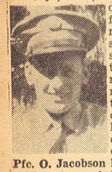Ex-Central High Pupil with Platoon
“Lost” in Orchard for 10 Days
Pfc. Orleane Jacobson Has Hazardous Experience.
By Louise Flynn.
Twenty-three soldiers—one of them a Sioux City boy—crowded in four fox holes in an orchard for 10 days, cold, hungry, and under shellfire from the Germans who were seemingly in a solid ring around them. Their ammunition was almost spent, and the boys had decided they would have to surrender unless relief came within an hour.
The story of the 10 days and nights, an ordeal shared by Pfc. Orleane Jacobson of Sioux City, was described vividly in a recent issue of the Stars and Stripes, in a dispatch from the Ninth infantry division in Germany.
A German counterattack had cut off the men in the fight to take Butzdorf south of Trier. After three unsuccessful attempts to break through the ring, their platoon leader and two men had crawled out to try to reach American lines. Those left behind had no way of knowing they had succeeded, and had tried unsuccessfully to come to the aid of the men in the orchard.
German Medics Approach.
“We gotta forget the cold. We gotta kill Germans, that’s all,” T. Sgt. Arnold A. Petry of Long Beach, N.Y., told them. The bodies out front were proof that they had.
The Stars and Stripes story continues, “On the third day German medics approached with a white flag and asked if there were any wounded who needed attention. Reluctantly Petry surrendered the three wounded men he had and the Germans went away. Five minutes later artillery racked the positions; miraculously there were no casualties.
“Food was a pressing problem. Their seven cans of C rations went the first day. After that there were boxes of crackers from the packs of dead Germans out front. The water shortage was solved by placing snow, halazone tablets and lemon powder in helmets and melting it by sitting on the helmets.
“Some of the men read prayer books, but mostly, they sat waiting and watching and talking. They talked about how the Russians might be doing, and about food.
“On the fifth night a German field kitchen set up 300 yards away. Ammunition was too slow to do anything about it, so they sat and watched and sniffed the aroma of cooking food coming down the wind.
Got Weak from Cold.
“The 10th night came. Weak from cold and hunger, with ammunition almost exhausted, they huddled together and talked over the prospects. They didn’t see how they could hold out much longer.
“Suddenly one of the men shouted and pointed to the rear. American doughboys were approaching. The men in the foxholes yelled at them. The doughboys stopped, suspicious, apparently, of the cries in English, then slipped out of sight.
“Spirits in the ‘lost platoon’ sank to their lowest. If help didn’t come by 2200, they decided there was only one thing to do.
“Petry looked at the luminous hands on his watch. They pointed to 2200. He whispered:
“To hell with the bastards. Let’s stick it out.”
Finally Rescued.
“At 2300 hours, out of the darkness around the foxholes, came men of the 376th infantry regiment, driving anew for Butzdorf, and the ‘lost platoon’ was relieved.
Most of the men had to be helped back to company C. P. There they ate K rations and gulped coffee and then lay down to sleep. In the morning they returned to their own company and four for three more days before being sent back to rest.
“Some of the 23 still don’t know about Petry, the sergeant—with the watch—how, six years ago, he deserted the Hitler youth movement in his native Germany and went to live in the United States.”
Pfc. Jacobson, one of the 23 men, was wounded in action January 28, and again March 6, when serving with Gen. Patton’s Third army. Before going overseas in June 1944, he finished David Rankin government school and another government school in Texas, and served as an instructor at Camp Blanding, Fla. He attended West junior school and Central high school and is the son of Mrs. J. M. Jacobson, 2801 Center street.
Source: Sioux City Journal-Tribune, Thursday, March 22, 1945 (photo included)
![]()

